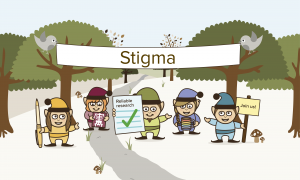
Sadly, stigma is not a new phenomenon outside of the woodland. We try and try to educate our non-woodland friends, but somehow the message appears to be getting lost in translation.
Even the Prime Minister Theresa May highlighted earlier this month that:
For too long mental illness has been something of a hidden injustice in our country, shrouded in a completely unacceptable stigma and dangerously disregarded as a secondary issue to physical health….yet left unaddressed it destroys lives, it separates people from each other and deepens the divisions within our society. Changing this goes right to the heart of our humanity; to the heart of the kind of country we are, the values we share, the attitudes we hold and our determination to come together and support each other. 9/1/17
Couldn’t have put it better myself.
She isn’t the first person (and probably not the last) to say this. Even going as far back as 1808 when Professor Johann Reil; German physician, physiologist, anatomist and psychiatrist identified that an anti-stigma campaign was necessary for mental illness and that humanity should be primary in treatment. That was over 200 years ago (#ElfSigh).

Johann Christian Reil first coined the term psychiatry in Germany in 1808, and with it came his view that anti-stigma work was needed.
If you are reading this you will likely be aware of the high individual and societal costs and burden of mental illness. This is in part because help-seeking is often delayed or completely avoided; the Mind Charity report that, on average, people will wait over a year from symptom onset to seeking help. Can you imagine anybody ever doing that with a physical illness?
Stigma related to mental disorders or mental health services is regarded as a main reason for insufficient help-seeking. Schnyder et al have published a systematic review and meta-analysis in The British Journal of Psychiatry to estimate the impact of stigma types on active help-seeking in the general population.
Different types of stigma
In order to do this we also need to be aware of what ‘stigma’ actually means. I personally hadn’t really considered what different types of stigma there may be. The paper outlines four:
- Perceived public stigma (PublicS)
- the individual’s perception of public stigma
- Personal stigma (PersonS)
- personal attitudes towards members of a stigmatised group and can find a behavioural expression in the desire for social distance
- Self-stigma (SelfS)
- an individual affected by a mental illness endorses stereotypes about mental illness, anticipates social rejection, considers stereotypes to be self-relevant and believes himself or herself to be a devalued member of society
- Attitudes towards help-seeking (HelpA)
- includes the perception of a need for help, openness regarding one’s problems and confidence that the help will be of assistance

Mental health stigma is a topic we’ve frequently covered in the woodland.
Methods
The team performed a systematic review of three electronic databases (PubMed, PsycINFO and EMBASE) with no language restriction. Quantitative, cross-sectional or longitudinal surveys examining the impact of at least one of the four stigma types on actual help-seeking were eligible. This was then followed by random effect meta-analyses according to the four stigma types. Odds ratio (OR) for stigma effect on help-seeking was the main outcome measured.
Results
7,968 papers were initially identified; this was whittled down to 27 studies which fulfilled the eligibility criteria. This included 31,677 participants who were aged 15 years or older.
Associated with less active help-seeking for mental health problems:
- Negative HelpA (OR = 0.80, 95% CI 0.73 to 0.88) and
- Higher PersonS (OR = 0.82, 95% CI 0.69 to 0.98)
Higher SelfS (OR = 0.88, 95% CI 0.76 to 1.03) showed an indication of less active help-seeking, but the results were not statistically significant.
PublicS (OR = 0.97, 95% CI 0.93 to 1.02) and the unspecific GenS (OR = 0.98, 95% CI 0.84 to 1.15) were not associated with active help-seeking.
There was substantial between-study heterogeneity in each of the meta-analyses, but between-study variance was low to moderate. None of the stratification analyses could fully explain the observed heterogeneity.

Personal attitudes towards mental illness or help-seeking are associated with active help-seeking for mental problems.
Conclusions
Participants’ own negative attitudes towards mental health help and their stigmatising attitudes towards people with a mental illness are associated with less active help seeking for mental problems.
The results confirm the notion that stigma related to mental illness or mental health services is directly associated with less active help-seeking for mental problems in the general population. The strength of association depends on the type of stigma, rather than being the case for stigma in general.
Included studies investigated at least one of the four types of stigma, but varied greatly in their assessment which may lead to some inconsistencies, especially with the level of heterogeneity identified.
Campaigns promoting help-seeking and fighting mental illness-related stigma should target these personal attitudes rather than broad public opinion.

Anti-stigma programmes should target personal attitudes towards mental illness.
Discussion
There are several key anti-stigma campaigns that I wanted to highlight. There is Time to Change a growing movement of people changing the attitudes and behaviours of millions of people across England. Today is #TimeToTalk Day 2017. Making time to have a cup of tea or go for a walk, and listening to someone talk about how they feel can make such a positive difference.
The Royal College of Psychiatrists have identified that one-third of medical students may be put off psychiatry as a career choice by stigmatisation. This has started the #BantheBash campaign. BASH = Badmouthing, Attitudes and Stigmatisation in Healthcare as experienced by medical students.
Finally, I wanted to share with you a blog written by Mandy Stevens, a Director of Nursing and Mental Health Services) who recently shared her own personal experiences of mental ill health in: From NHS Director to mental heath inpatient in 10 days (published on LinkedIn on Jan 16th 2017).
As Mandy herself put it:
I lost my mind, lost my self esteem, lost my pride, lost my sense of who I am, lost my confidence, lost my job & my income, lost my driving licence and my independence…but I am slowly picking up the pieces…like a smashed vase, gluing itself together into a beautiful mosaic. I will be strong again. I will be ok.
We have the power to change someone’s life; so come on woodland folk get chatting!
Links
Primary paper
Schnyder et al. (2017) Association between mental health-related stigma and active help-seeking: systematic review and meta-analysis. The British Journal of Psychiatry 1–8. doi: 10.1192/bjp.bp.116.189464 [Abstract]
Other references
From NHS Director to mental heath inpatient in 10 days. Mandy Stephens, 16 Jan 2017.
Photo credits
CC BY 2.0
CC BY 2.0

I think there also is the view that mental health services can promote stigma by promoting an illness model and diagnostic categories and focusing on symptoms rather than causes to distress, and are campaigns that focus on “it’s OK to be ill” helping or hindering stigma?